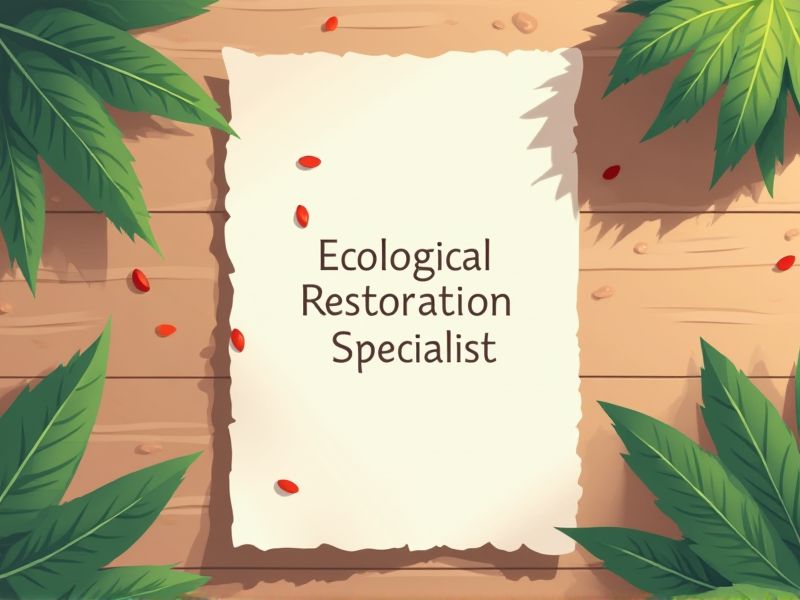
Ecological Restoration Specialists rehabilitate damaged ecosystems, necessitating specific certifications to affirm their expertise. These certifications validate their knowledge in understanding complex ecological interactions and applying appropriate restoration techniques. Regulatory requirements and industry standards often mandate these credentials to ensure the protection and conservation of biodiversity. Essential certifications for an Ecological Restoration Specialist may include those related to habitat conservation, environmental science, and project management.
Certified Ecological Restoration Specialist (CERS)
Certified Ecological Restoration Specialists (CERS) are needed to ensure restoration projects adhere to best practices, guaranteeing successful ecosystem rehabilitation. Their certification indicates they possess current knowledge of ecological science and effective restoration techniques. The involvement of certified specialists often results in improved project outcomes by mitigating past ecological damages. Their expertise supports the development of sustainable ecosystems, enhancing biodiversity and resilience.
Certified Environmental Professional (CEP)
A Certified Environmental Professional (CEP) is essential for an Ecological Restoration Specialist because it ensures they meet professional standards in environmental science which aligns with restoration goals. Their certification demonstrates a comprehensive understanding of ecological systems, crucial for designing and implementing successful restoration projects. Having a CEP also indicates continued education and adherence to best practices, necessary for adapting to evolving environmental regulations. The certification enhances trust and credibility with stakeholders and regulatory bodies, which can facilitate project approvals and collaborations.
Certified Wetland Professional (CWP)
Certified Wetland Professionals enhance the credibility of ecological restoration projects by ensuring adherence to scientific and regulatory standards. Their expertise in wetland ecosystems allows for accurate assessment and effective restoration strategies, directly affecting project success rates. CWP ensures proper identification and management of wetland species, which influences biodiversity outcomes. Their comprehensive knowledge helps in navigating complex regulatory processes, influencing the timely completion of restoration initiatives.
GIS Professional (GISP)
A GIS Professional (GISP) is essential for an Ecological Restoration Specialist due to their ability to integrate spatial data, which facilitates precise habitat assessment. Their expertise in spatial analysis aids in identifying critical environmental stressors impacting the targeted ecosystems. GISPs contribute to effective project planning by mapping historical and current land use, enabling predictive modeling of future restoration outcomes. Analysis and visualization of geographic information through GIS improve communication and decision-making in multidisciplinary ecological teams.
LEED Accredited Professional (LEED AP)
The presence of a LEED Accredited Professional (LEED AP) in ecological restoration projects ensures adherence to sustainable building and environment-friendly design principles, driving more efficient and ecologically responsible outcomes. Their knowledge on optimizing resource use can result in reduced ecological footprint and improved energy efficiency within restoration projects. Integration of LEED AP expertise helps strengthen project proposals by aligning them with global sustainability standards, making them more appealing to stakeholders and funding entities. Familiarity with LEED guidelines enables these specialists to better navigate regulatory landscapes, often accelerating project approvals and implementation.
Certified Wildlife Biologist (CWB)
Certified Wildlife Biologists (CWB) possess specialized knowledge crucial for accurately assessing wildlife populations and their habitats, which informs effective ecological restoration strategies. Their expertise ensures that restoration projects align with conservation goals, enhancing biodiversity and ecosystem resilience. CWBs understand legislative and regulatory frameworks, ensuring that restoration efforts comply with environmental laws and policies. Their skills in monitoring and evaluating project outcomes are critical for adapting management practices to changing ecological conditions.
Project Management Professional (PMP)
An Ecological Restoration Specialist managing large-scale projects benefits from PMP certification by enhancing their skills in planning, execution, and resource allocation, directly influencing project success rates. Projects in ecological restoration often have complex timelines and budgets; PMP training provides the tools needed to maintain control over these critical project aspects. Effective communication and stakeholder management are vital in restoration efforts due to diverse interests; PMP certification strengthens these abilities, ensuring alignment and collaboration. The risk management strategies taught in PMP help specialists identify potential project barriers, enabling proactive mitigation and minimizing ecological and financial impacts.
Certified Conservation Professional (CCP)
Certified Conservation Professional (CCP) validates an individual's expertise, thus increasing trust with stakeholders. The certification ensures that the professional adheres to best practices, leading to more effective restoration outcomes. CCP provides continuous learning opportunities, which keeps specialists up-to-date with evolving ecological techniques and policies. Hiring CCP-certified specialists often results in improved project credibility and potential funding access.
Certified Habitat Restoration Specialist (CHRS)
The role of a Certified Habitat Restoration Specialist (CHRS) ensures that ecological restoration projects adhere to the best practices and standards, leading to more successful and sustainable outcomes. Their certification guarantees a level of expertise that minimizes the risk of further ecological damage due to poorly executed restoration efforts. With extensive knowledge in ecosystem dynamics, a CHRS can effectively design and implement projects tailored to specific habitats and species. Employing a CHRS helps organizations meet regulatory requirements and enhance their credibility and accountability in conservation endeavors.
Soil and Water Conservation Certification (SWCC)
Soil and Water Conservation Certification equips an Ecological Restoration Specialist with essential skills to sustainably manage natural resources. It ensures expertise in preventing soil erosion, a critical factor in maintaining ecosystem health. This certification provides foundational knowledge in water management, vital for restoring and maintaining habitats. Candidates with SWCC can better adhere to environmental regulations, enhancing project credibility and success.
Summary
With certification in ecological restoration, you can expect to gain enhanced credibility and trust in the field. This legitimization often leads to increased job opportunities and potential for higher salaries. Specialized training through certification typically results in improved skills and knowledge, enabling you to execute more effective restoration projects. Networking opportunities often arise from certification programs, allowing you to connect with other professionals and foster collaborations.
